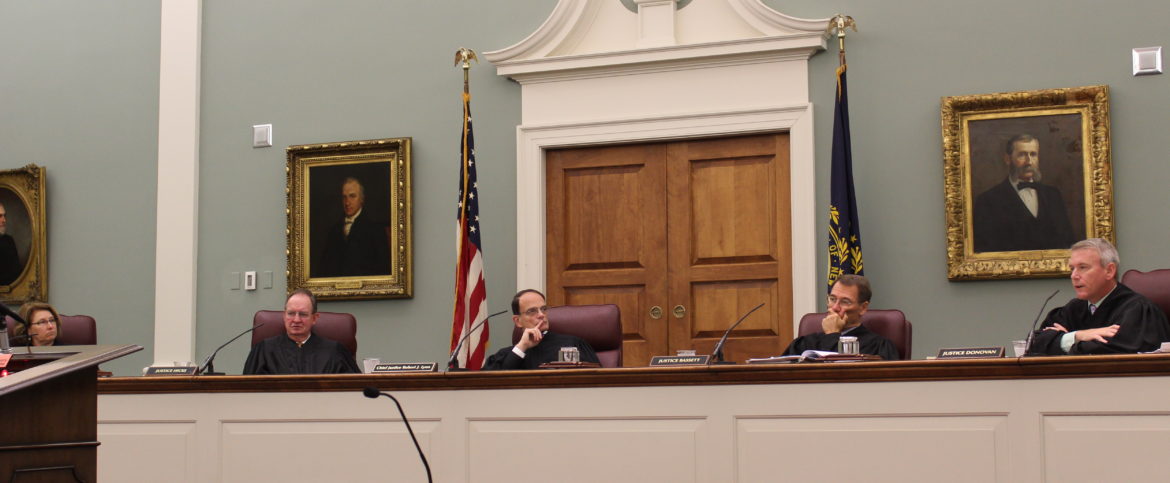By NANCY WEST, InDepthNH.org
CONCORD – The state Supreme Court has set May 15 for oral arguments in Eversource’s appeal of the Site Evaluation Committee’s denial of the Northern Pass project, according to an order signed on Wednesday.
Eversource will have a total of 50 minutes, and the respondents that requested oral argument in their briefs will have a total of 50 minutes with an oral argument schedule to be issued separately.
The court denied a motion to strike portions of Eversource’s brief and appendix but said it will disregard the appendix and portions of the brief that discuss transcript excerpts of the SEC’s deliberations in the unrelated Seacoast Reliability Project.
Eversource appeal
Eversource argued in its appeal that the SEC’s denial of the proposed 192-mile transmission line from Pittsburg to Deerfield was a rush to judgment filled with legal errors. The $1.6 billion plan would have brought Hydro-Quebec electricity through New Hampshire to Massachusetts.
Eversource argued that the SEC failed to do the work required by law and its own rules, strayed from normal regulatory procedures, made an arbitrary and unreasonable decision, and failed to weigh the project’s benefits against its undue impacts.
“Instead, in its haste to be done, it elected to cut short deliberations, seize on (Eversource’s) purported failures to satisfy hitherto nonexistent burdens of proof, and concluded that it had no obligation to go further,” wrote attorney Wilbur Glahn, who will argue the case for Eversource. “This resulted in an unlawful, arbitrary and unreasonable decision.”
Opposition briefs
In its opposition brief, the Society for the Protection of New Hampshire Forests asked the Supreme Court to affirm the SEC denial. The Society argued that Eversource’s appeal presents no substantial question of law, the state regulators’ decision is due substantial deference, and the record contains competent evidence to support the SEC’s decision.
The Society also argued that the SEC made no reversible error when it determined Eversource did not provide sufficient, credible evidence to prove that the project would not cause undue interference on orderly development.
On Feb. 1, 2018, the SEC determined Eversource failed to meet it burden of proof that the project would not unduly impact the orderly development of the region. The SEC said Eversource experts on tourism, property values and land use were not credible.
After 70 adjudicative hearings, the SEC found that Eversource had the financial and technical capability to build the project. But it made no determination on the other two criteria in the law for siting energy projects: whether it would have unreasonable adverse effects on aesthetics and whether issuing a certificate to build would be in the public interest.
McKenna’s Purchase
In its opposition brief, Intervenor McKenna’s Purchase Unit Owners Association concluded: “In the end, the Applicants played a cynical game of dice and lost.
“In an effort to minimize their mitigation costs, they bet that the SEC would accept the opinion of Chalmers that the Project would have no discernable effect on property values. The SEC did not find Chalmers’ opinion to be credible.”
McKenna’s Purchase group went on: “It is no wonder that the SEC denied the Applicants’ Motion for Rehearing and attempt to expand the record. Now, through this appeal, the Applicants are again effectively seeking to reopen the record to introduce new evidence to compensate for the deficiencies in their Application before the SEC. The SEC did not buy it and neither should this Court.”
Wednesday’s order said the court will consider a motion’s separate failure-to-preserve argument as part of the court’s consideration of the merits.
Counsel for the Public’s motion to strike the argument section of Eversource’s notice of supplemental authority was denied, the order stated.
“In light of the length of the argument section of the petitioners’ notice of supplemental authority, as well as the significantly overlapping nature of the respondents’ briefs, the petitioners shall be limited to one reply brief, not to exceed 6,000 words,” the order said.
The order was signed by Chief Justice Robert Lynn, with the other four justices concurring.





